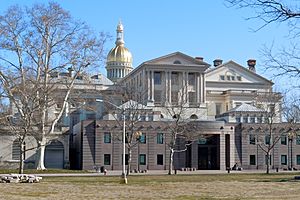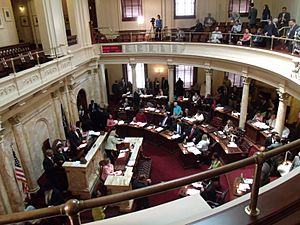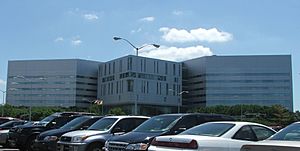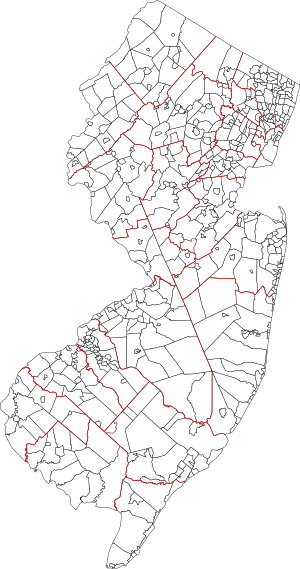Government of New Jersey facts for kids
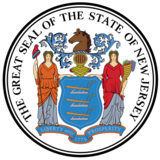
|
|
| Polity type | Sub-national administrative division (federated state) |
|---|---|
| Part of | United States of America |
| Constitution | Constitution of New Jersey |
| Legislative branch | |
| Name | Legislature |
| Type | Bicameral |
| Meeting place | New Jersey State House |
| Upper house | |
| Name | Senate |
| Presiding officer | Nicholas Scutari, President |
| Lower house | |
| Name | General Assembly |
| Presiding officer | Craig Coughlin, Speaker |
| Executive branch | |
| Head of State and Government | |
| Title | Governor |
| Currently | Phil Murphy |
| Appointer | Election |
| Cabinet | |
| Name | New Jersey Cabinet |
| Leader | Governor |
| Deputy leader | Lieutenant Governor |
| Headquarters | State House |
| Judicial branch | |
| Name | Judiciary of New Jersey |
| Courts | Courts of New Jersey |
| Supreme Court of New Jersey | |
| Chief judge | Stuart Rabner |
| Seat | Richard J. Hughes Justice Complex, Trenton |
The government of New Jersey works to serve its people. It is set up with three main parts: the legislative, executive, and judicial branches. These parts share power, making sure no single group has too much control. This system is based on the Constitution of New Jersey, which was put in place in 1947.
The state capital of New Jersey is Trenton. Like many other states, New Jersey also allows local governments for counties and towns.
Executive Branch
The executive branch is like the management team of the state. It carries out the laws and runs the daily operations. This branch has departments and agencies that handle different tasks.
The Governor

The Governor is the leader of the executive branch. Think of the Governor as the state's chief executive officer. People vote for the Governor, who serves a four-year term. A Governor can serve two terms in a row. There is no limit on how many total terms they can serve.
The Governor lives at Drumthwacket in Princeton, New Jersey. Their main office is at the New Jersey State House in Trenton. The Governor also chooses important officials like the New Jersey Attorney General and the Secretary of State of New Jersey. These choices must be approved by the state Senate.
The Lieutenant Governor
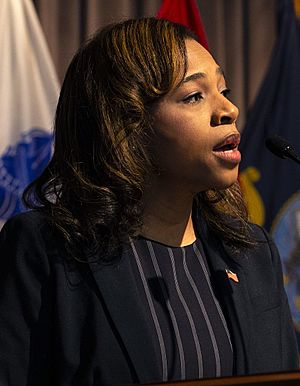
The Lieutenant Governor is the second-highest official in New Jersey's government. This person is elected along with the Governor for a four-year term. The Lieutenant Governor's main job is to take over if the Governor cannot do their job.
Before 2010, New Jersey did not have a Lieutenant Governor. If the Governor left office, the leader of the State Senate would take over. After a few times when Governors resigned, people wanted a clearer plan for who would be next in charge. So, in 2005, a vote changed the constitution to create the Lieutenant Governor position.
Kim Guadagno was the first person to serve as Lieutenant Governor in this modern role. She was chosen by Governor Chris Christie in the 2009 election. The current Lieutenant Governor must also lead one of the state's departments or agencies.
State Departments
The executive branch has many departments that help run the state. The Governor appoints the leaders of these departments. As of 2024, New Jersey has 15 main departments. Here are a few examples:
- The Department of Agriculture helps farmers and protects the state's food supply.
- The Department of Education oversees public schools and helps students.
- The Department of Environmental Protection works to keep New Jersey's air, water, and land clean.
- The Department of Health focuses on public health and licenses hospitals.
- The Department of Transportation manages roads, bridges, and public transit.
Legislative Branch
The legislative branch is responsible for making laws. New Jersey has a bicameral (two-house) Legislature. It includes the Senate and the General Assembly.
There are 40 legislative districts in New Jersey. Each district elects one Senator and two Assembly members.
- Assembly members serve two-year terms. They are elected in odd-numbered years.
- Senators serve terms that are either two or four years long. This "2-4-4" cycle helps make sure Senate elections happen after new district maps are drawn based on the United States Census.
To be a Senator, you must be at least 30 years old and have lived in New Jersey for four years. To be an Assembly member, you must be at least 21 years old and have lived in your district for one year and in the state for two years. Many legislators have other jobs because their work in the Legislature is considered part-time.
Senate Leadership
The Senate has leaders who help guide its work.
| Senate leadership | Assembly leadership | |||||||
|---|---|---|---|---|---|---|---|---|
| Senate position | Senator | Party | Senate district | Assembly position | Representative | Party | Assembly district | |
| President of the Senate |
Nicholas Scutari |
Democrat | New Jersey's 22nd legislative district | Speaker of the Assembly |
Craig Coughlin |
Democrat | New Jersey's 19th legislative district | |
| President pro tempore | Democrat | New Jersey's 31st legislative district | Speaker pro tempore | Democrat | New Jersey's 35th legislative district | |||
| Majority Leader |
Teresa Ruiz |
Democrat | New Jersey's 29th legislative district | Majority Leader |
Louis Greenwald |
Democrat | New Jersey's 6th legislative district | |
| Minority Leader |
Anthony M. Bucco |
Republican | New Jersey's 25th legislative district | Minority Leader |
John DiMaio |
Republican | New Jersey's 23rd legislative district | |
General Assembly Leadership
The Assembly is led by the Speaker. The Speaker is chosen by the Assembly members. This person decides the Assembly's schedule and which bills will be discussed. The Speaker is third in line to become Governor if the Governor and Lieutenant Governor cannot serve. The current Speaker is Craig Coughlin.
Judicial Branch
The judicial branch is the court system. It interprets the laws and makes sure they are applied fairly. New Jersey has several levels of courts.
Supreme Court of New Jersey
The New Jersey Supreme Court is the highest court in the state. It hears appeals from lower courts. The Court has a chief justice and six other justices. The Governor appoints these justices, and the Senate must approve them.
Justices serve an initial seven-year term. After that, they can be reappointed to serve until they are 70 years old. This court is the final say on all state law cases in New Jersey.
Superior Court of New Jersey
The New Jersey Superior Court handles most of the state's trial cases. It has three main parts:
- The Appellate Division hears appeals from trial courts. It reviews decisions made in lower courts.
- The Law Division handles cases like criminal trials and lawsuits.
- The Chancery Division deals with cases like family matters, business disputes, and property issues.
Judges for the Superior Court are also appointed by the Governor and confirmed by the Senate. They serve initial seven-year terms. If reappointed, they can serve until age 70.
Municipal Court
Municipal Courts are the local courts. They handle everyday legal matters. This includes traffic tickets, minor criminal offenses, and small civil cases.
Tax Court
The Tax Court handles disagreements about taxes. Judges in this court hear appeals about state income, sales, and business taxes. They also hear appeals about property taxes.
Local Government
New Jersey's government also includes local levels. These are counties and municipalities (cities, towns, townships, boroughs, and villages).
Counties
New Jersey has 21 counties. Each county is run by a Board of County Commissioners. These commissioners are elected by the people. They manage many county services, like roads, parks, and some public safety. Some counties also have a directly elected county executive. This person handles the daily executive tasks for the county.
Municipalities
New Jersey has 564 municipalities. These are the local cities, towns, and villages. Every part of New Jersey belongs to a municipality. There are no areas in the state that are not part of a town or city. Municipalities can be very small, with only a few residents, or very large, like Newark or Trenton. Each municipality has its own local government.
School Districts
New Jersey also has school districts. These districts manage public schools. Each district has a board of education that oversees the schools. A superintendent leads the schools in each district. Some districts are for a single town, while others cover multiple towns or a whole county.
See also
- Elections in New Jersey
- Politics of New Jersey
- Law of New Jersey
 | James Van Der Zee |
 | Alma Thomas |
 | Ellis Wilson |
 | Margaret Taylor-Burroughs |


